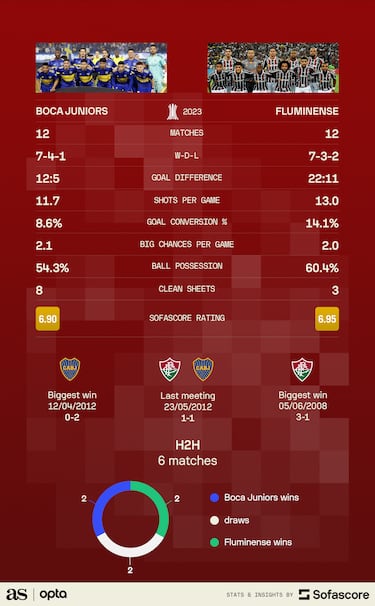Copa Libertadores: which teams have won the most times? Complete list of winners
Boca Juniors face Fluminense at the Maracana Stadium in Rio on Saturday in the 64th edition of the Copa Libertadores.


The biggest game in South American club football will take place on Saturday in Rio de Janeiro as the Maracana stadium hosts the 2023 Copa Libertadores final between Fluminense and Boca Juniors. The Brazilian team will have a slight advantage of playing at home against the Argentinian side looking to secure their seventh title, with a win set to see the Xeneizes draw level with Independiente who hold the record with seven Libertadores triumphs. El Tricolor from Rio are looking for their first ever title having only progressed to this stage once in their history ending up with a runners up medal after losing to LDU Quito in the 20028 final.
🇦🇷🆚🇧🇷 It's CONMEBOL #Libertadores Final week in Rio de Janeiro as #BocaJuniors and #Fluminense prepare to face-off for #GloriaEterna! ⭐️ pic.twitter.com/dETg1J1tpp
— CONMEBOL Libertadores (@TheLibertadores) October 30, 2023
Anticipation among both sets of fans is running at fever pitch with more than 100,000 Boca Juniors fans set to descend on the Brazilian city over the weekend for the final and Fluminense ‘torcedores’ hoping that Saturday will be the biggest night in the club’s 121-year history.

Overall winners
South American footballing powerhouses Argentina and Brazil lead the way when it comes to overall winners of the competition with Argentine clubs lifting the trophy in 25 occasion to the 22 of Brazil. Peru, Bolivia and Venezuela are the three CONMEBOL nations never to have a club representative lift the famous cup.
Related stories

Change coming for Copa Libertadores 2024

100,000 Boca fans set to descend on Rio for Libertadores final
Avellaneda based Club Atletico Independiente lead the way in overall Libertadores glory with ‘El Rojo’ crowned champions on seven occasions with the club winning the title four times back to back in the 1970s. Boca Juniors will be looking to emulate their Buenos Aires rivals on Saturday having recorded six final wins with Uruguay’s Peñarol coming third in the overall wins ranking with five titles, the last of those triumphs however coming back in 1987. Argentine duo Estudiantes and River Plate follow next in the ranking with four wins a-piece with Rver’s last win coming famously at Real Madrid’s Santiago Bernabéu stadium when security measures forced the second leg of the final to be moved to the Spanish capital.
Así está el ranking de los equipos argentinos ganadores de Copa Libertadores 🏆
— TNT Sports Argentina (@TNTSportsAR) November 1, 2023
¿Alcanzará Boca a Independiente? pic.twitter.com/wjVCjl3l3l
As of the 2019 season, and as a measure against the scenes that were witnessed in the Argentine capital ahead of the River-Boca final, CONMEBOL decreed that the final would be a one off game (as opposed to a two legged affair) at a neutral final venue that would be established ahead of the tournament.
Copa Libertadores: winners
2022 Flamengo
2021 Palmeiras
2020 Palmeiras
2019 Flamengo
2018 River Plate
2017 Grêmio
2016 Atlético Nacional
2015 River Plate
2014 San Lorenzo
2013 Atlético Mineiro
2012 Corinthians
2011 Santos
2010 Internacional
2009 Estudiantes
2008 LDU Quito
2007 Boca Juniors
2006 Internacional
2005 São Paulo
2004 Once Caldas
2003 Boca Juniors
2002 Olimpia
2001 Boca Juniors
2000 Boca Juniors
1999 Palmeiras
1998 Vasco da Gama
1997 Cruzeiro
1996 River Plate
1995 Grêmio
1994 Vélez Sársfield
1993 São Paulo
1992 São Paulo
1991 Colo-Colo
1990 Olimpia
1989 Atlético Nacional
1998 Nacional
1987 Peñarol
1986 River Plate
1985 Argentinos Juniors
1984 Independiente
1983 Grêmio
1982 Peñarol
1981 Flamengo
1980 Nacional
1979 Olimpia
1978 Boca Juniors
1977 Boca Juniors
1976 Cruzeiro
1975 Independiente
1974 Independiente
1973 Independiente
1972 Independiente
1971 Nacional
1970 Estudiantes
1969 Estudiantes
1968 Estudiantes
1967 Racing
1966 Peñarol
1965 Independiente
1964 Independiente
1963 Santos
1962 Santos
1961 Peñarol
1960 Peñarol